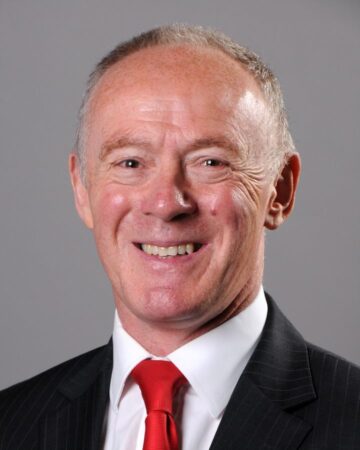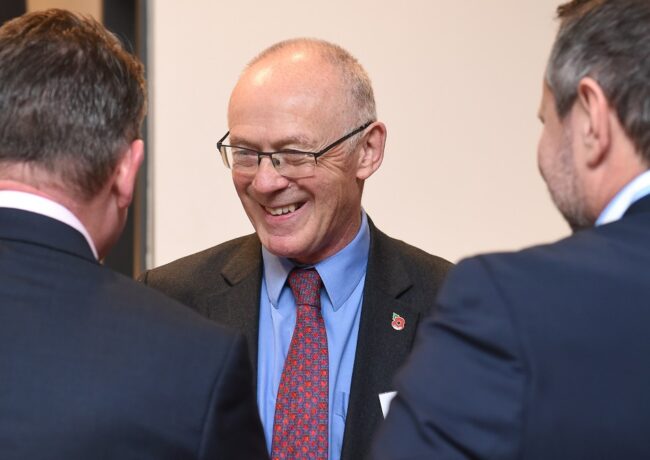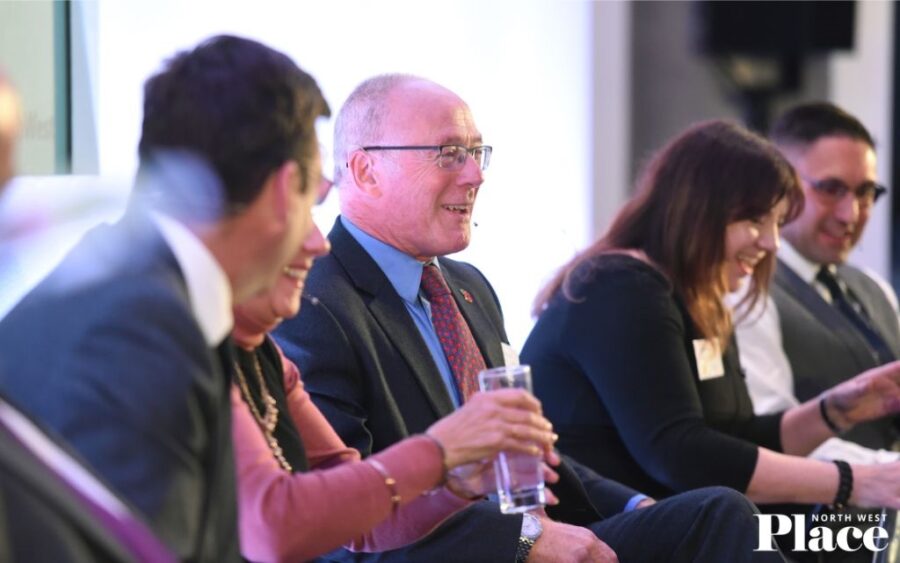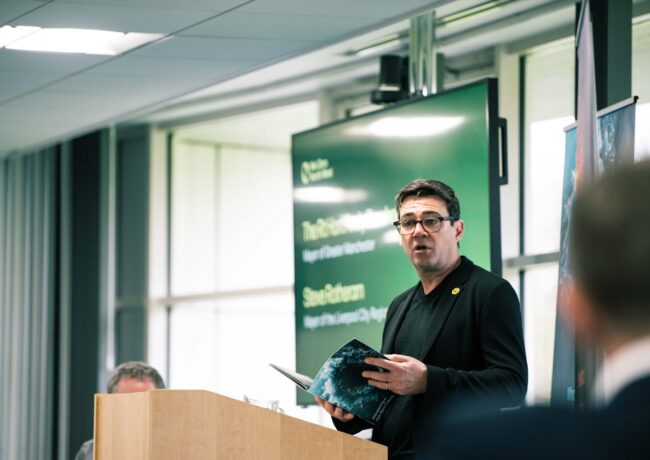Sir Richard Leese: An uncompromising leader who always put Manchester first
Sir Richard Leese took even close friends and colleagues by surprise on Tuesday night by announcing he was to step down as leader of Manchester City Council in December, and would not stand for re-election in May as a councillor for Crumpsall.
In so many ways it was a typical Leese. Unpredictable, no leaks, disciplined, thoroughly thought through and utterly uncompromising.
The nod to his personal life in his resignation was also an admission that he only has one mode in which to do the demanding job of leader. To work incredibly long hours, to read the papers, to make the phone calls, to have the numbers before any meeting that potentially threatened to weaken his position. To hold a position as leader of a city for 25 years, you work hard and that takes a toll.
That he would retire close to his 70th birthday in April this year was obvious, though the timing was not. Indeed, whispering and speculation about the great Manchester succession drama predate even the elegantly choreographed departure of chief executive Sir Howard Bernstein in 2017. Word was they were going to leave together, but whereas the city could recruit from anyone in local government circles for a chief executive, settling on Wakefield’s Joanne Roney – the shallow pool to fish from for a new leader came from within the council’s Labour group, and frankly Leese didn’t think any of them were quite up to it.
His work ethic – like Bernstein’s – was unrelenting. Allies and foes alike describe how he doesn’t suffer fools or slackers. In meetings he would listen, rarely interrupt, but then come down on the unprepared and the dissenting ‘like a ten-ton truck’ with no fear or favour of anyone’s previous close relationship. Indeed, his greatest political trick wasn’t that he had an inner circle, but that he didn’t – but plenty of people in the town hall still thought they were in it.
Leese took office a quarter of a century ago, at a time when the civic leadership of England’s cities had chosen a path of compromise rather than conflict. And just as Andy Burnham’s toughest test came with the terrorist attack on Manchester Arena in 2017, so too Leese had to mop up the aftermath of the IRA bombing of the Arndale Centre soon after taking office in 1996.
The tributes from the business and regeneration world have quite rightly pointed to those major achievements: the transformed city, the expansion of the Corridor, the Commonwealth Games, the investment in Manchester City FC, of Spinningfields, Ancoats, the Airport and improved neighbourhoods across the city.
Chis Fletcher, deputy chief executive of Greater Manchester Chamber points out that the shape and look of the city centre, in particular, will be his enduring legacy. But that Leese’s greatest strength and source of comfort for business was his single-mindedness. “He managed to take the politics out of it with business people by focusing on the economic development of Manchester. He got that, and with Sir Howard Bernstein he really spoke their language. He could be brutal at times, but you always know where you stand with him and that’s not something that’s true of all politicians.”
Property fixer Ken Bishop, typically generously for many in the property sector, pays tribute to Leese as a thoroughly decent man but said he effectively outsourced much of the day-to-day dealing with developers to Bernstein, a neat way of separating their leadership roles. “Manchester has been extremely fortunate to have had the double act of Sir Richard and Sir Howard Bernstein which have propelled the fortunes of the city way above those of anywhere else.”
Peel L&P executive director of development James Whittaker praised Leese. “Sir Richard has been an incredible leader not just for Manchester but for the whole Greater Manchester transforming the region into a vibrant place to live, work and play. He has driven forward the city’s regeneration to improve prosperity, transport and health across Manchester.”
In 2015, as Manchester signed a major devolution deal with then-Chancellor George Osborne, veteran journalist Simon Jenkins, writing in The Guardian, described Leese as “a quieter Bernstein” a comparison that anyone raised in Manchester’s political circles would have found baffling. But to be fair to Jenkins, if you’d sat in a face to face meeting with him in the gothic Town Hall and he’d quietly explained Manchester’s stealthy path towards fiscal devolution, economic development and bus reform, then you’d be faced with a thoughtful and softly spoken local politician who wisely sought compromise and outcomes. But these are two sides of the Leese persona that don’t contradict each other. He’s forceful on the message when needed because he’s done the detail beforehand.
He could be absolutely brutal with political opponents, showing no flicker of compromise or recognition of an alternative path, be that on the rancourous and doomed campaign for a congestion charge in 2008, or with ‘sectarian left’ opponents in the Labour group who deposed his friend Nigel Murphy. Or even in the relatively low stakes confines of a debate above a pub on the merits or otherwise of HS2. On one wet Wednesday night in 2014, he brutally demolished the arguments of the anti-HS2 lobby and continued his unrelenting hectoring of the defeated opponent long after the motion was carried.
He would do so with sharp and direct humour. At a New Statesman conference in Manchester in 2019, Leese was at his scathing best as he dismissed advocates for a combined authority for the whole of Yorkshire as “ridiculous,” scoffing that these structures work for functional economic geographies and you can’t build one around “a brand of tea”.
He championed unfashionable political causes long before they became hyper fashionable, a transition towards low carbon being the most notable.
He wasn’t without charm and diplomacy, especially when it came to working the private sector and the Tory government. But his end goal was always getting a decent outcome for Manchester.

Sir Richard Leese has represented Crumpsall in the council since 1984. Credit: via Manchester City Council
An ally from the environmental movement, LEP board member Steve Connor, points out that Manchester was one of the first cities to launch a climate action plan in 2009: “This was championed by Sir Richard who was always particularly motivated by the fact that the climate crisis would hit the poorest hardest, and so building a more resilient city was a clear priority.”
His relationship with the role of a directly elected Metro Mayor hasn’t always been easy.
Andy Burnham sought early counsel from Labour grandees on how to make the relationship work better.
For Leese, the election of a charismatic retail politician to the role of Mayor wasn’t the outcome of the system he envisaged. First of all, he wanted to appoint one of their leaders from within, but George Osborne insisted on a directly elected model. Leese and the other leaders would probably have preferred someone like Peter Smith or Tony Lloyd doing the red carpet stuff while Leese operated alongside doing the hard work and the detailed hard-nosed negotiations on buses and health devolution. It took some time for the two to work each other out. Or as Leese would put it, teasingly, though without blinking, Greater Manchester only has a directly elected Mayor as the price worth paying for bus reform.
Leese will also bequeath a hard-working political legacy. If the Labour Party wants to know how to win again, there are probably more lessons to be learned organisationally from Manchester Labour than just a shrug about demographics. As red walls collapse everywhere, they don’t in Manchester. Councillor contracts in the Labour group in Manchester require a high contact rate and have been adopted nationally as a high minimum standard. Deselections of councillors who can’t do numbers are performance-based, not ideologically grounded.
On national Labour issues, he sometimes seemed blithely disengaged, a signifier that Manchester was his priority. He was quite candid that he was no fan of Tony Blair even at the height of New Labour and much closer to a leader like Neil Kinnock. He led a highly personal campaign firmly against the decision of transport secretary Alastair Darling to cut funding for Metrolink expansion, waving banners saying ‘move over Darling’. He voted for Andy Burnham in his ill-fated 2010 leadership election, and spoke forcefully at the rally for Caroline Flint for deputy in 2015, and expressed the view that she should have stood for leader.
Speculation will naturally follow as to who the succession will favour. It’s to Leese’s credit that he has actively pushed for better female and ethnic representation in the chamber, for a council to look like its city even though the Afro-Caribbean community is poorly represented, so the strong contenders are likely to be statutory deputy Bev Craig and deputy leader Luthfur Rahman.







The architectural race to the bottom in Manchester will be his legacy’s defining moment. He will not be missed.
By Resident Eville
The focus on property development and speculation post IRA bombing served the city well but I’m not so sure who this form of regeneration was for. Clearly a rising city centre housing/culture/leisure tide did not lift all boats and far too little has been done to develop or connect opportunity to existing residents. Some would say you can’t argue with the cash sloshing around the place…but to what end? Whether its making it the UK’s largest student village, a haven for foreign money in Salford Quays gated communities, or legitimising an Emirate …what’s it all actually mean when Piccadilly is full of spice heads off their box, or a long-term council resident doesn’t know is they’ve any place or stake amongst Urban Splash’s lofts? The corporatism of the skyline is impressive and depressing at the same time and the eulogies from the property sector incredibly telling. Being no fan of Tony Blair is one thing, but then leading your city towards the practical image of the New Labour ideal/legacy is another – rootless 20th century global modernism. Hard to love the place these days.
By Sceptic
From left wing firebrand to local political great, Sir Richard leaves the City and the wider Greater Manchester area in much better shape than the legacy he inherited from the loony Stringer years (nuclear free city and all that for those to young to remember!). For sure, he didn’t get everything right, no one ever does, but his legacy is a good one and largely rooted in engagement with the business community, the government of the day and a passion to make Manchester a better place to live and work in.
The challenge now is to find a successor to maintain the high bar Sir Richard has set. the last thing Manchester needs is a lurching back into an ideologically driven leftist political agenda than will serve no one well, other than those who hold office.
We could do with people like Sir Richard in Westminster as the current crop on ALL sides is woeful. There speaks a Tory voter.
By Grumpy Old Git
Not that difficult a job when central governments of varying shades fall over themselves to fund your projects, and when civil servants are just down the street.
By Anonymous
Like a lot of places that successfully hit the growth button, there are a set of quality of life and equity issues get after, probably someone now who strikes a different balance.
By Rich X
To counter the negatives below & from an interested observer not in property – following the departure of SHB, this marks a genuine changing of the guard from a dynamic duo who designed, developed & delivered a yet greater Manchester for past, present & future generations, cementing its status as the UK’s second city & on the day Manchester is ranked by Time Out as the world’s third best city. Yes, there’s so much more to be done, so a size 12 pair of shoes to be filled by the next incumbent. Whatever you think of one or both of them, they had the best interests of the city at heart.
By Justin M Strong
Although he didn’t get everything right(Piccadilly Gardens) the transformation of the city centre over the last 25 years has been remarkable for which he can take deserved credit. Manchester City Centre in the 90s was a pretty soulless place with few residents and little to offer the visitor. The centre is now thriving with residents, visitors and workers which some commentators choose to ignore. I hope his sucessor is as equally visionary. For sceptics information I am not a private property developer just a Mancunian with a long memory and I for one love the place now also I think you will find Salford Quays is in Salford not Manchester.
By Manchester resident
Some very narrow minded people who cannot accept what a great job Leese has done for Manchester.
By Dan
You can’t put a nice dress on a plain girl and expect her to be pretty. People should remember this when pointing blame over Piccadilly Gardens and its environs.
Manchester is a working city and I do enjoy the Manchester experience, though I couldn’t imagine myself living there.
Manchester’s leaders have done very well considering. Looking at what wasn’t done and ignoring what was has always been the norm.
By Liverpool romance
@anonymous actually the evidence of Liverpool shows just what a difficult job it is to achieve the sort of outcomes Leese has. Down the M62, they’ve benefitted from every regeneration, urban and regional policy going and had more government cash than almost anywhere else yet the office sector there is still moribund and large parts of Liverpool council found to be utterly dysfunctional as has been widely reported.
Leese has survived 30 years at the top of one of the biggest local authorities. Not only has he survived survived the cut and thrust of local politics but he’s thrived, evidently achieved a great deal, overseeing the comprehensive reinvention of Manchester, physically and economically. SRL deserves great credit and a well earned rest.
Just one request for his successor, please please sort out the Arndale. That thing remains a huge blight on the city centre.
By Anon 2
Yeah don’t get the negativity towards this man from some of the commenters. I agree a change is probably needed but this man has done an amazing job on the whole, taken the city to the next level and worked very hard to achieve it. I wonder how much some of the people leaving negative comments have achieved compared to him. Let just hope the person who comes into the job is up to it. No doubt Manchester has some very good councilors (Lucy Powell being one) however it also has some awful ones (no names mentioned).
By Bob
An impressive record indeed over many years. You only have to look at the transformation in public transport, the entire office districts and the 10’s of thousands of jobs that have been brought . That’s leadership. All the more impressive when you look at other cities such as Liverpool over the same time frame, and I know Liverpool’s future may be far behind it but even so his Leadership has brought about Manchester’s growth into one of Europe’s great cities.
By NoRomance
A Man who likes to get His points across. I like Him for His forthrightedness. I hope He pushes for the movement of the local hospital in My Area as it’s old & dangerous. I visit every year.
By Miss Y Taylor